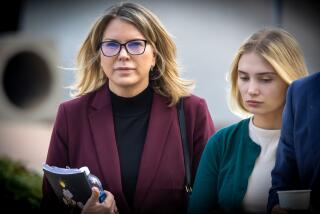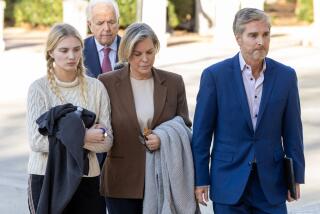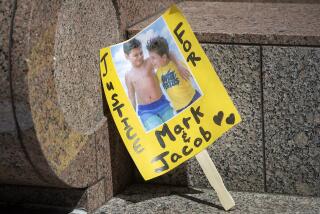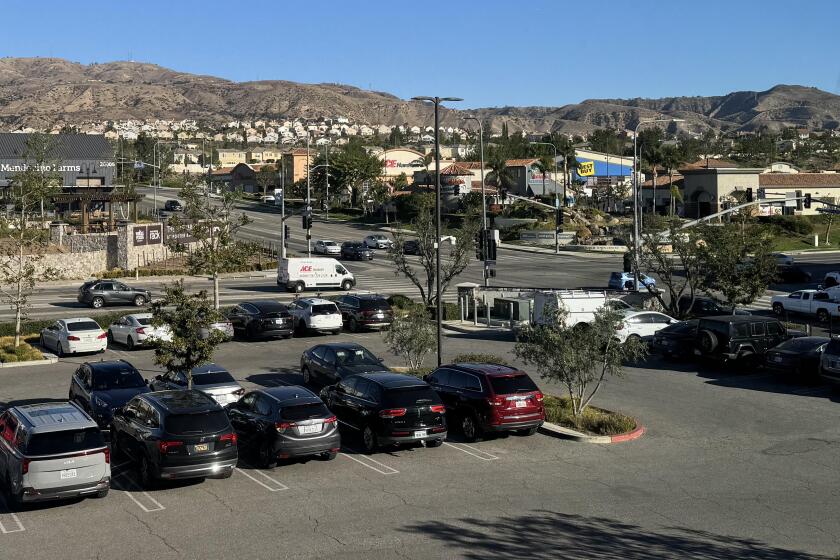HOW THEY’RE DOING : Injury Slowed Georgeson, He Wasn’t Stopped
- Share via
MALIBU — Mark Georgeson shuffles across the Pepperdine University campus and tries to remember what it was like to walk without stiffness in his hip. Loping along without discomfort is a distant memory.
Georgeson spends seven days a week rehabilitating. He lifts weights, does aerobics and treads water in a swimming pool. Still, he hobbles.
Basketball used to be Georgeson’s game. He was highly recruited as a senior at Marina High School in 1987 and has played with and against some of the best in the country. Now, climbing stairs is a challenge.
If anyone has a right to be depressed, it’s Georgeson. His life and basketball career were smashed, destroyed and mangled last Valentine’s Day, along with the car he was driving.
But Georgeson will have none of that. Pity? Save it for someone who needs it. Georgeson says he is the luckiest guy around.
Nearly 10 months after regaining consciousness in what was left of his Honda Civic, Georgeson is happy, content and, he says, better off than before.
He has undergone four surgical procedures to repair damage from the accident. But while his mobility is impaired, he’s still moving forward.
“Things never really stopped for me, it was more of a pause,” Georgeson said. “When you have a dream, like basketball, and then have it taken away, you can do one of two things. You can bitch and moan or you can try to put the pieces back together.”
The pieces are there. The puzzle has changed.
Georgeson, a 6-foot-10 center who would have had two years of eligibility left--he averaged 4.0 points in 20 games last season--remains on scholarship. He helps with the team’s post players and goes to nearly every game, sitting on the bench.
But he has refocused his life, and playing basketball is no longer at the center of it. Talking, teaching and helping are his games.
For the past three months, Georgeson has been a volunteer at Camp David Gonzalez, which is run by the Los Angeles County probation department. Director Bob Stanley says the juveniles who have been sent there have committed felonies.
“Mark has a good rapport with the kids here,” Stanley said. “Part of that might be because of his size. But it is also because of the problems Mark has been through. They can relate.”
Georgeson became involved with the camp through his fiancee, Stella Berkebile, who teaches there. He spends two hours almost every evening working with the kids, coaching basketball, teaching English and sometimes just talking.
At first, the going was tough, the kids wary. But gradually, Georgeson has reached them by talking about his own experience.
“It’s tough for someone to get up in front of a crowd and talk about success,” Georgeson said. “Not everyone can understand that, because not everyone has experienced success. But you get up there and talk about anxiety, about fear, about losing things and about pain, and every person will listen. Everyone has experienced pain, whether its physical or mental.”
Georgeson has worked closely with several kids at the camp and even brought two of them to a recent Pepperdine game. Georgeson has been so effective with the kids that Stanley has offered him a job. But Georgeson turned it down because he wants to finish his education.
He is scheduled to graduate next December and said he might accept the job then.
“We’ve had former NFL players come here and other athletes come here to talk to the kids, but none has been as effective as Mark,” Stanley said. “I wish we could get him here full time.”
For now, Georgeson is happy to volunteer. His main goal is to organize a basketball team--Camp Gonzalez was recently admitted to the Southern Section.
He hopes to open the season Jan. 17.
“Really, I’ve gotten far more from the kids there then they have from me,” Georgeson said. “I learned that you can always find someone who is worse off than you are.
“I remember I showed them my scar one time, and this kid lifts up his shirt and showed me three scars on his chest from bullet holes. I certainly have been much more fortunate than they have.”
To get to Camp David Gonzalez, Georgeson has to drive along one of the winding canyon roads that lead out of Malibu. It’s the same road he took Feb. 14.
Georgeson, who had transferred to Pepperdine from Arizona in 1988, was feeling pretty good that night. Pepperdine had lost at Loyola Marymount that evening, but he was confident the Waves would win a rematch three nights later.
He had rounded a curve when headlights flashed in front of him. It’s the only thing Georgeson remembers about the accident.
“I woke up with the steering wheel up in my face,” Georgeson said. “I couldn’t feel my leg. There was a bone coming out of my knee, and I was bleeding from my scalp.”
David Campbell, a Pepperdine assistant, lived near Georgeson and was a few minutes behind. When he came upon the scene, he stopped but didn’t realize Georgeson was one of the victims.
“It obviously had just happened, because the cars were still smoldering,” Campbell said. “Someone else had stopped, and I told him that I would go for help. Mark must have recognized my voice, because I heard him yell, ‘Coach.’ It was then I recognized his car.”
Two other drivers stopped and were sent for help. Campbell stayed and tried to comfort Georgeson.
“Coach kept saying, ‘You’re going to be all right; you’re going to be all right,’ ” Georgeson said. “They way he said it made it sound like I wasn’t all right at the time.”
He wasn’t. Georgeson had a broken pelvis, a broken leg, three broken ribs and a large gash on the top of his forehead.
The paramedics arrived 20 minutes later. They took the other driver away in a helicopter. He later died of injuries sustained in the accident.
Georgeson was pinned in the car, so they had to free him with the “Jaws of Life.” It was a slow process because of the way he was situated. After nearly an hour, they finally worked Georgeson free and took him to Westlake Hospital.
“Mark’s mom called me about 1:30 a.m. and asked me to drive her to the hospital,” said Berkebile. “When we got there, they were just getting Mark’s clothes off. They didn’t say that he would make it, and they didn’t say he wouldn’t make it. After six hours of surgery, they finally told us he was going to be all right.”
For the next 40 days, Georgeson was in the hospital. He had two operations on his hip, one on his face and one on his knee.
Berkebile, who attended Newport Christian High School in Newport Beach, refused to leave the hospital except to get a change of clothes. She slept on a cot in his room and showered in the nurses’ locker room.
Three nights after the accident, Pepperdine beat Loyola Marymount, 131-123. The Wave players wore blue ribbons on their uniforms to honor Georgeson.
“As soon as the game was over, I grabbed the game ball,” Pepperdine Coach Tom Ashbury said. “All the players signed it and I took it over to the hospital that night. Mark was awake when I got there, but he was in a fog because of the medication he was on. I left the ball on the bed.”
The next morning, Georgeson woke up to find the ball and realized Pepperdine had won.
“That was one of the greatest feelings I’ve ever had,” he said. “It made me feel like I had a lot of special friends.”
During the next few weeks, cards, letters and gifts were delivered in bunches.
Georgeson was hampered by a foot injury as a freshman and played only six minutes for Arizona before transferring midway through the 1988-89 season. Still, he was remembered. There were more than 1,000 letters from people who lived in Tucson.
“There was one letter I know I’ll always remember,” Georgeson said. “It was from a girl who had gone with her family to Kansas City for the Final Four (in 1988). On the way home, they were hit by a drunk driver, and her father and brothers were killed.
“The letter she sent me had happy faces on it, and she wrote that I shouldn’t get down. I broke down and cried. Here was someone who had been thrown something a lot worse than me and she was encouraging me.”
Georgeson will never play basketball competitively again. Doctors have told him that he could possibly play in two or three years, but Georgeson said he won’t chance it.
“They said I could develop severe arthritis in my hip if I played,” he said. “I want to have a family and I want to play with my kids in the yard. I don’t want to be confined to a chair while they grow up.
“Besides, I’ve already gotten far more out of basketball than I put into it.”
More to Read
Get our high school sports newsletter
Prep Rally is devoted to the SoCal high school sports experience, bringing you scores, stories and a behind-the-scenes look at what makes prep sports so popular.
You may occasionally receive promotional content from the Los Angeles Times.







